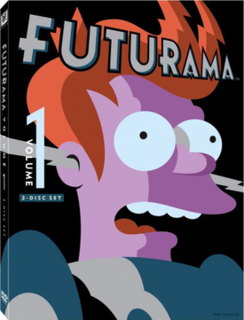Alien primarily refers to:

The 1939–40 New York World's Fair was a world's fair held at Flushing Meadows–Corona Park in Queens, New York, United States. It was the second-most expensive American world's fair of all time, exceeded only by St. Louis's Louisiana Purchase Exposition of 1904. Many countries around the world participated in it, and over 44 million people attended its exhibits in two seasons. It was the first exposition to be based on the future, with an opening slogan of "Dawn of a New Day", and it allowed all visitors to take a look at "the world of tomorrow".

Futurama is an American adult animated science fiction sitcom created by Matt Groening that premiered on Fox on March 28, 1999. The series follows the adventures of the professional slacker Philip J. Fry, who is cryogenically preserved for 1000 years and revived on December 31, 2999. Fry finds work at an interplanetary delivery company, working alongside the one-eyed Leela and robot Bender. The series was envisioned by Groening in the mid-1990s while working on The Simpsons; he brought David X. Cohen aboard to develop storylines and characters to pitch the show to Fox.

John William DiMaggio is an American actor. His various voice roles include Bender on Futurama, Jake the Dog on Adventure Time, Marcus Fenix in the Gears of War series, Dr. Drakken on Kim Possible, Hak Foo in Jackie Chan Adventures, The Scotsman on Samurai Jack, Brother Blood on Teen Titans, Shnitzel on Chowder, Fu Dog on American Dragon: Jake Long, Hammerhead and Sandman on The Spectacular Spider-Man, Aquaman on Batman: The Brave and the Bold, King Zøg on Disenchantment, Wakka and Kimahri in Final Fantasy X, Rath and Aggregor on Ben 10, and Gonza in the English version of Princess Mononoke.

The first season of Futurama began airing on March 28, 1999 and concluded on November 14, 1999 after 13 episodes.

I Think We're All Bozos on This Bus is the fourth comedy album made by the Firesign Theatre for Columbia Records, released in August 1971. In addition to standard stereo formats, the album was released as a Quadraphonic LP and Quadraphonic 8-Track. It was nominated for a Hugo Award for Best Dramatic Presentation in 1972 by the World Science Fiction Society.
The universe is all existing matter.

A hover car is a personal vehicle that flies at a constant altitude of up to few meters above the ground and used for personal transportation in the same way a modern automobile is employed. The concept usually appears in science fiction.
Starfire or Starfires may refer to:
The world is a common name for the whole of human civilization, specifically human experience, history, or the human condition in general, worldwide, i.e. anywhere on Earth.

"Space Pilot 3000" is the pilot episode of the American animated television series Futurama. It originally aired on the Fox network in the United States on March 28, 1999. The episode focuses on the cryogenic freezing of the series protagonist, Philip J. Fry, and the events when he awakens 1,000 years in the future. Series regulars are introduced and the futuristic setting, inspired by a variety of classic science fiction series from The Jetsons to Star Trek, is revealed. It also sets the stage for many of the events to follow in the series, foreshadowing plot points from the third and fourth seasons.
Supercar was a Japanese rock band active from 1995 to 2005, who made their debut in 1997. Consisting of composer and vocalist Kōji Nakamura, lyricist and guitarist Junji Ishiwatari, bassist Miki Furukawa, and drummer Kōdai Tazawa, Supercar is best known for combining alternative rock with electronic music and has been characterized as having an "almost foundational importance to 21st century Japanese indie rock". Internationally, Supercar is also known for providing much of the soundtrack for the Japanese film Ping Pong, as well as being featured in the anime series Eureka Seven.
Locus is Latin for "place". It may refer to:
Answer commonly refers to response to a question.

Futurama is the third album by the Japanese indie rock band Supercar. The album's name is a portmanteau of the words "future" and "panorama." Musically, its electronic experimentation marked a significant shift for a group whose music two years earlier had been characterized primarily as guitar rock.

Futurama: Worlds of Tomorrow is a freemium mobile game for iOS and Android, based on the American animated series Futurama. It was released on June 29, 2017 and features stories written by writers from the TV series with the show's original cast voicing their respective characters.
This page is based on this
Wikipedia article Text is available under the
CC BY-SA 4.0 license; additional terms may apply.
Images, videos and audio are available under their respective licenses.








